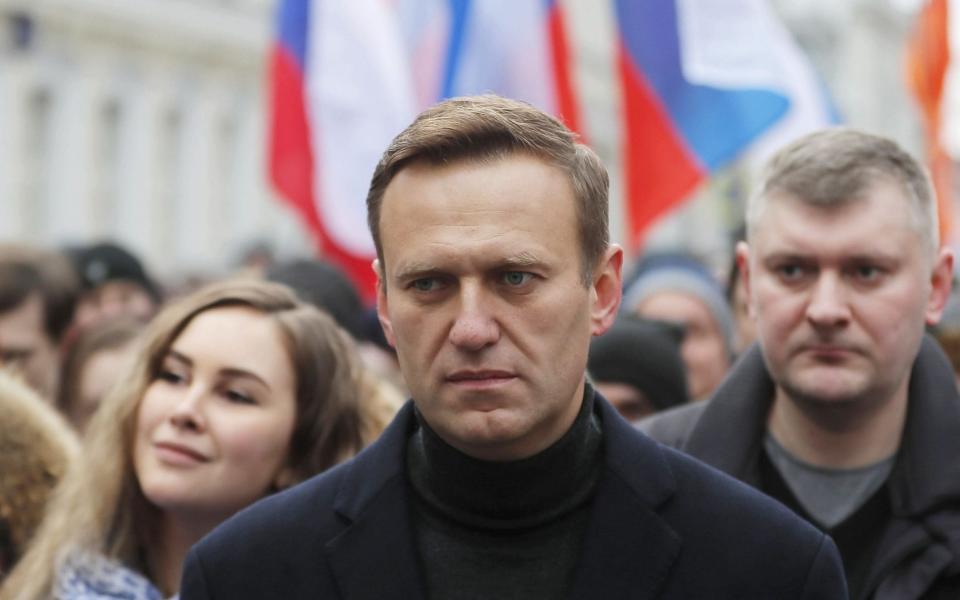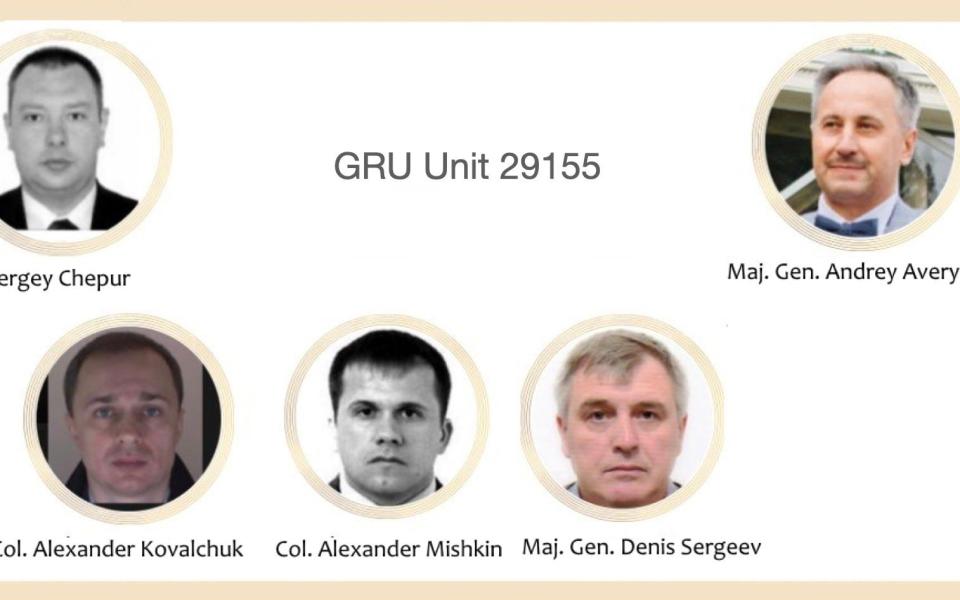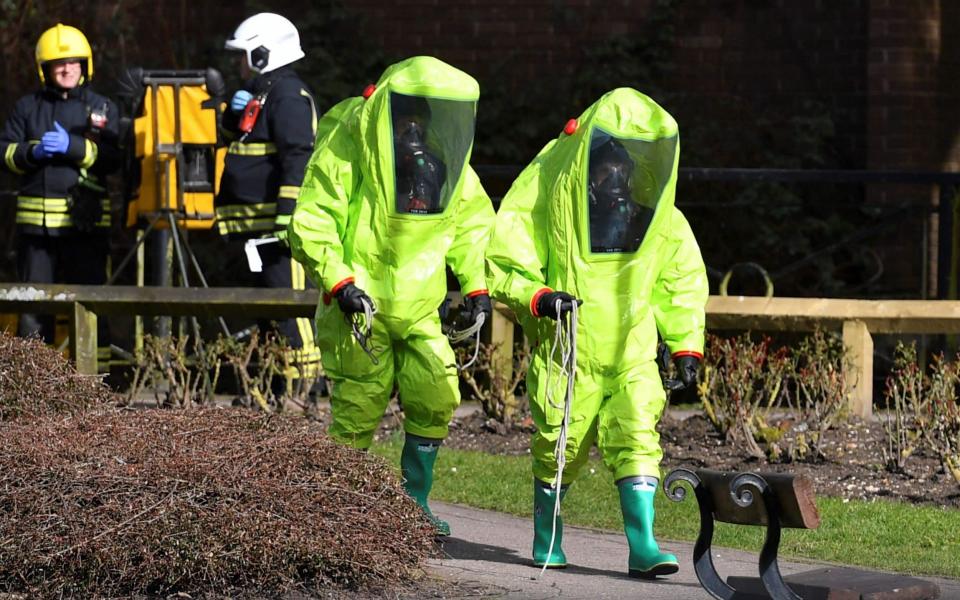Russia should be 'confronted' over continued use of chemical weapons, says Defence Committee head

Russia is still developing chemical weapons like novichok, the head of the defence committee has warned, despite promises to destroy its stockpiles.
It is time to confront Russia over ongoing breaches of the UN’s Chemical Weapons Convention, which Moscow ratified in 1997, and continued nerve agent attacks on opponents, say leading figures.
Tobias Ellwood, chair of the Commons Defence Select Committee, and Hamish de Bretton-Gordon, a chemical and biological security expert, have called for Britain to show leadership over the issue.
It is the UK’s “duty” as host of next year’s G7 meeting to ensure the issue is on the agenda, the former Defence Minister said.
Speaking to the Telegraph, Mr Ellwood said Russia should be held to account over breaches of the Chemical Weapons Convention.
“The convention has no teeth. It hasn’t got the ability to investigate. There’s no authority by an international body to command an investigation into something as serious as this,” he said
“You need to be able to quickly establish where these factories are located and have them closed down.”
“If Russia has breached international law we need to confirm that. There is no enforcement behind the convention. It has no backbone.”

In a recent letter to the Telegraph Mr de Bretton-Gordon said the Organisation for the Prohibition of Chemical Weapons confirmed two weeks ago that the strain of novichok used to poison Russian opposition leader Alexei Navalny was different to that used in the Skripal attack in Salisbury.
“The inference from this is that Russia has an active chemical weapons programme despite having declared to the UN Security Council in 2017 that it was free of chemical weapons,” he wrote.
The security experts say biological and chemical agents are “effective weapons of lethality...for the assailant without morals or scruples".
The August 2013 attack on East Ghouta, Syria, killed up to 1,500 people including women and children. President Assad did not believe the international community had “the stomach for action, especially with the Russians propping him up,” the experts said. “And he was right.”
“Chemical weapons are morbidly brilliant for fighting in built up areas.
“Gas from chemical attacks seep into every hiding space and cellar, rendering it a very cost-effective weapon of mass destruction rather than risking manpower clearing areas house by house,” the experts said.
Mr Ellwood said Britain’s ability to identify the grade of novichok used in the May 2018 Salisbury attack, where it was manufactured and how it was used was “phenomenal”.
“These are skill sets you’d be hard pushed to find anywhere else in the world.”
He highlighted a 12-month study by the open source investigation group Bellingcat that has further exposed Russia’s clandestine chemical weapons programme.
The study alleges Unit 29155 of the GRU carried out the Skripal and Navlany attacks.

The call for action comes after the European Union imposed sanctions on October 15 on six senior Russian officials and a leading Russian research institute over the Navalny poisoning.
The Bellingcat investigation team says that since 2010 the St. Petersburg State Institute for Experimental Military Medicine of the Ministry of Defence, likely with the assistance of researchers from the Scientific Center Signal, has taken the lead role in the continued novichok programme.
Mr Ellwood plans to invite Bellingcat analysts to give evidence to his committee in the near future.

RUSSIA'S ONGOING CHEMICAL WEAPONS PROGRAMME
by Tobias Ellwood MP and Hamish de Bretton-Gordon
In 1979 a Soviet bio-chemical warfare facility sprung a deadly leak. The secret military base was developing anthrax warheads for inter-continental ballistic missiles to target western cities including London. Over a hundred people in a neighbouring brick factory died but thanks to the slick Soviet propaganda machine the local butcher took the fall blaming a bad batch of meat for the deaths.
Given the Soviets had signed the Biological Weapons Convention three years preciously, Moscow had to keep its clandestine operation under wraps. With the Cold War over we might assume such bio facilities are a thing of the past. Far from it.
The recent nerve agent attack against Russian Opposition leader Alexi Navalny, continued reports of chemical barrel bomb attacks in Syria and lingering questions over the exact cause of COVID-19 should be a wake-up call to the West. Bio-chemical weapons continue to be researched, developed and deployed. But the West is slow to respond.
For the assailant without morals or scruples, bio/chemical agents are effective weapons of lethality.
As illustrated by the Novichok poisoning in Salisbury, on an isolated level, agents are simple to transport, easy to disguise, straight forward to discharge and plausible to deny.
Utilised in a wider capacity they are morbidly brilliant for fighting in built up areas. Conventional munitions can raise buildings to the ground but gas from chemical attacks seep into every hiding space and cellar rendering it a very cost-effective weapon of mass destruction rather than risking manpower clearing areas house by house.
Thanks to the incredible skills at MOD Porton Down and Mi6 the agent used in Salisbury was eventually identified, as was the Military Lab where it was made and the names of the Russian GRU personnel who conducted the mission.
The West responded to this news by dismissing Russian diplomats from across the world. But the attack on Navalny proves Russia’s behaviour has not changed. Indeed a 12-month study by the highly respected open source investigator Bellingcat has further exposed Russia’s Clandestine Chemical Weapons Programme and the GRU’s Unit 29155.
It’s clear Russia continues to develop the deadliest nerve agents ever produced - specifically designed to overmatch Nato defences.
Russia’s oversight of Syria’s barrel bomb attacks illustrates how the proliferation of biochemical weapons is widening.
The West’s credibility to punish such use disappeared after President Obama, declared his red line against the use of chemical weapons by the Syrian regime, and it was then ignored.
In August 2013 Assad was about to fall with the rebels pressing hard on the capital. Then came the massive nerve agent attack on East Ghouta, killing up to 1500 people including women and children. He did not believe the international community had the stomach for action, especially with the Russians propping him up. And he was right.
It’s true the West has retaliated with punitive strikes on two occasions, in April 2017 and 2018. But this did not alter Assad’s behaviour.
What message does this send to any state or not state actor seeking territorial gain or silencing of anti-government voices ?
And like any other weapon of war, they are often exported, stolen or copied – falling into another tier of adversaries such as terrorists and criminals perusing their own disruptive agendas.
As we consider our own defence posture through the Integrated Review, we must firstly consider how prepared the West is to respond to a Russia that might deploy chemical weapons. And secondly, how wider the chemical and biological threat environment has dramatically increased.
The West is now aware Russia’s highly advanced and toxic Russian chemical weapons programme and undeclared stockpile.
In 2021 the UK hosts the next G7 meeting. This needs to be on the agenda. It is time to confront Russia.
Rt Hon Tobias Ellwood MP Chair Defence Select Committee Hamish de Bretton-Gordon OBE Chemical & Bio Security Expert Author Chemical Warrior


